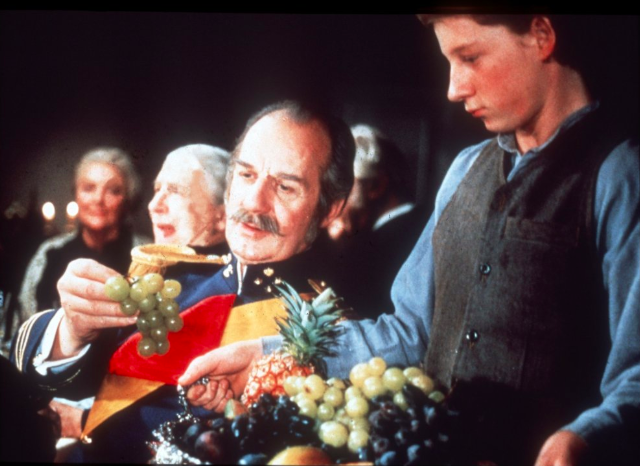In the United Kingdom (and in some other countries – notably those that used to be part of the British Empire) the day after Christmas is known as Boxing Day. This is probably because it was a day when tradesmen and servants were given ‘Christmas Boxes’ by those they served. Others think it may have been called Boxing Day because it became a day of sport, notably boxing. But it has now morphed into something else.
In the second half of the 20th Century it was really a time for the Boxing Day sales – a time to buy more stuff. Although this has been more limited by the import of the American ‘Black Friday’ in November and the fact that sales seem to begin before Christmas. Boxing Day is still a public holiday and a time when most people are with their families, recovering from the over indulgence of the day before.
Speaking of over indulgence – I came across this from Chrysostom in his homily on Matthew 23:15. It is quite challenging:
“Would you see also another multitude of dead? Let us see the lusts that arise from luxurious living, those that are cherished by the makers of sauces, by the cooks, the furnishers of feasts, the confectioners. For I am ashamed indeed to speak of all; however, I will tell of the birds from Phasis, the soups that are mixed from various things: the moist, the dry dishes, the laws made about these things. For as if they were ordering some city and marshalling hosts, even so these too make laws, and ordain such a thing first, and such a thing second. Some bring in birds first roasted on the embers, filled within with fish; and others make of other materials the beginnings of these unlawful feasts; and there is much rivalry about these things, about quality, and about order, and about quantity. They take a pride in the things, for which they ought to bury themselves in shame; some say that they have spent half the day, some all of it, some that they have added the night too. Behold, O wretched man, the measure of your belly, and be ashamed of your unmeasured earnestness!”…
 For some reason this made me think of Masterchef! A programme that I greatly enjoy watching and yet recently I have begun to think that, whilst I don’t share the asceticism of the Early Church Fathers, they may have a point. Certainly when I started to watch the Chefs Table, I gave up – sensing that there is something not quite right in all this over indulgence.
For some reason this made me think of Masterchef! A programme that I greatly enjoy watching and yet recently I have begun to think that, whilst I don’t share the asceticism of the Early Church Fathers, they may have a point. Certainly when I started to watch the Chefs Table, I gave up – sensing that there is something not quite right in all this over indulgence.
I don’t think there is anything wrong in enjoying fine food and good drink. The problem is when there is excess. When we over indulge. Not only does that harm us physically, but it harms us spiritually. It dulls our senses and we become those whose God is their belly (Philippians 3:19). There is also the fact that far too often we indulge at the expense of others – we feast while they starve.
One of the most extraordinary films I have ever seen is the 1988 Danish film Babette’s Feast, which shows a village of simple, austere, poor Danish Lutherans being served up a French feast by Babette who spends all her money on providing this one luxury for them. To my mind it is a beautiful picture of the Gospel.
Good food, gluttony, enjoying all things which God richly gives us, drunkenness, over indulgence, the poor and hospitality. The bible does have a great deal to say about these issues – and we would all do well to reflect on them this Boxing Day and as we head into a new year. May we enjoy what God has given, but may we never turn the gifts into gods. May we know joy and self-discipline in equal measure!
Ecclesiastes 3:9-11- There’s a reason why we’re born with a sense of eternity
Ecclesiastes 9: 4 biblical rules for enjoying life (and glorifying God)

I’m reminded of Jesus who the religious folk of His day accused of being a glutton and a drunkard. After all, His first miracle was changing water into wine at a celebration 🙂
They also accused him of being too austere! It’s strange how we love the bit about being accused of being a glutton or a drunkard. That does not excuse gluttony or drunkenness. It was a false accusation!
Chrysostom, like many Early Church Father’s was vegetarian. Considering the environmental impact of the meat industry, the awful conditions for abbatoir workers, the toxins in meat and the cruelty to animals, we would be well to aim for pre fall diets.
Sadly most religious people our unaware of the harm to their bodies caused by eating the flesh of animals.
Whilst Jesus didn’t excuse gluttony and drunkenness, He wasn’t afraid of mixing with gluttons, drunkards and other sinners for the sake of the good news for them. Obviously once we recieve the good news there’s no more room for gluttony and drunkenness.
I haven’t seen The Chef’s Table but you have got me curious now. If it is more excessive than Masterchef than I would agree it is over the top – I sometimes feel a bit uneasy at the luxuriousness on there especially while some people are starving and the excessive amount of time spent on technique and presentation for something that is going to be digested! Godliness in food and eating is certainly something for prayerful consideration and as Christians we need to be informed. I think good cooking is a godly thing – using fresh local produce where possible. But fresh local produce is becoming a luxury. Pity Scotland’s best fish is served up in restaurants in the likes of New York and Spain. We exploit Kenyan workers who produce green beans so we can have them out of season and of course they throw away the misshapen ones. We want the nutritional benefits of quinoa – which is a staple food in Bolivia. So they sell it to us and eat less nutritious noodles. Prawn production relies on extremely harsh working conditions, and often inhumane child and slave labour. Cashew nut and pineapple harvesting are frequently appalling and hazardous jobs. Are our hands clean? Horrendous disparity when it comes to food and it’s growing.
In the UK there is a real disconnect between the earth and the plate. Some of the obesity crisis is most seen in deprived areas – where many people don’t know how to cook and buy ready meals from the cheap Supermarkets and the chippy. So these people are overweight but malnourished. I found it notable that in a village in Africa where the children who were going hungry were provided a meal a day by an agency – which consisted of rice, lentils and split peas. It was probably a more nutritious meal than our kids get in the UK for school lunches!
The gluttony of fussiness about food.
It is an excess of what Lewis terms “delicacy.” So there are two types of excess, gluttony. See CS Lewis in the Screwtape letters: In the book, a senior demon Screwtape was explaining to a junior demon, Wormwood, the efficacy of promoting the sin of gluttony in their clients. A fellow demon, Glubose, had Wormwood’s client’s mother well in hand through the sin of gluttony.
Feast on this:
“My dear Wormwood,
The contemptuous way in which you spoke of gluttony as a means of catching souls, in your last letter, shows only your ignorance. One of the great achievements of the last hundred years has been to deaden the human conscience on that subject, so that by now you will hardly find a sermon preached or a conscience troubled about it in the whole length and breadth of Europe. This has largely been effected by concentrating all our efforts on gluttony of Delicacy, not gluttony of Excess. Your patient’s mother, as I learn from the dossier and you might have learned from Glubose, is a good example. She would be astonished–one day, I hope, will be–to learn that her whole life is enslaved to this kind of sensuality, which is quite concealed from her by the fact that the quantities involved are small. But what do quantities matter, provided we can use a human belly and palate to produce querulousness, impatience, uncharitableness, and self-concern? Glubose has this old woman well in hand. She is a positive terror to hostesses and servants. She is always turning from what has been offered her to say with a demure little sigh and smile, “Oh, please, please… all I want is a cup of tea, weak but not too weak, and the teeniest weeniest bit of really crisp toast.” You see? Because what she wants is smaller and less costly than what has been set before her, she never recognises as gluttony her determination to get what she wants, however troublesome it may be to others. At the very moment of indulging her appetite she believes that she is practising temperance. In a crowded restaurant she gives a little scream at the plate which some overworked waitress has set before her and says: “Oh, that’s far, far too much! Take it away and bring me about a quarter of it.” If challenged, she would say she was doing this to avoid waste; in reality she does it because the particular shade of delicacy to which we have enslaved her is offended by the sight of more food than she happens to want.
The real value of the quiet, unobtrusive work which Glubose has been doing for years on this old woman can be gauged by the way in which her belly now dominates her whole life. The woman is in what may be called the “All-I-want” state of mind. All she wants is a cup of tea properly made, or an egg properly boiled, or a slice of bread properly toasted. But she never finds any servant or any friend who can do these simple things “properly”–because her “properly” conceals an insatiable demand for the exact, and almost impossible, palatal pleasures which she imagines she remembers from the past; a past described by her as the “The days when you could get good servants” but known to us as the days when her senses were more easily pleased and she had pleasures of other kinds which made her less dependent on those of the table. Meanwhile, the daily disappointment produces daily ill temper: cooks give notice and friendships are cooled. If ever the Enemy introduces into her mind a faint suspicion that she is too interested in food, Glubose counters it by suggesting to her that she doesn’t mind what she eats herself but “does like to have things nice for her boy.” In fact of course, her greed has been one of the chief sources of his domestic discomfort for many years.” (pp. 77-78)
We long for the Wedding Feast. Or do we?